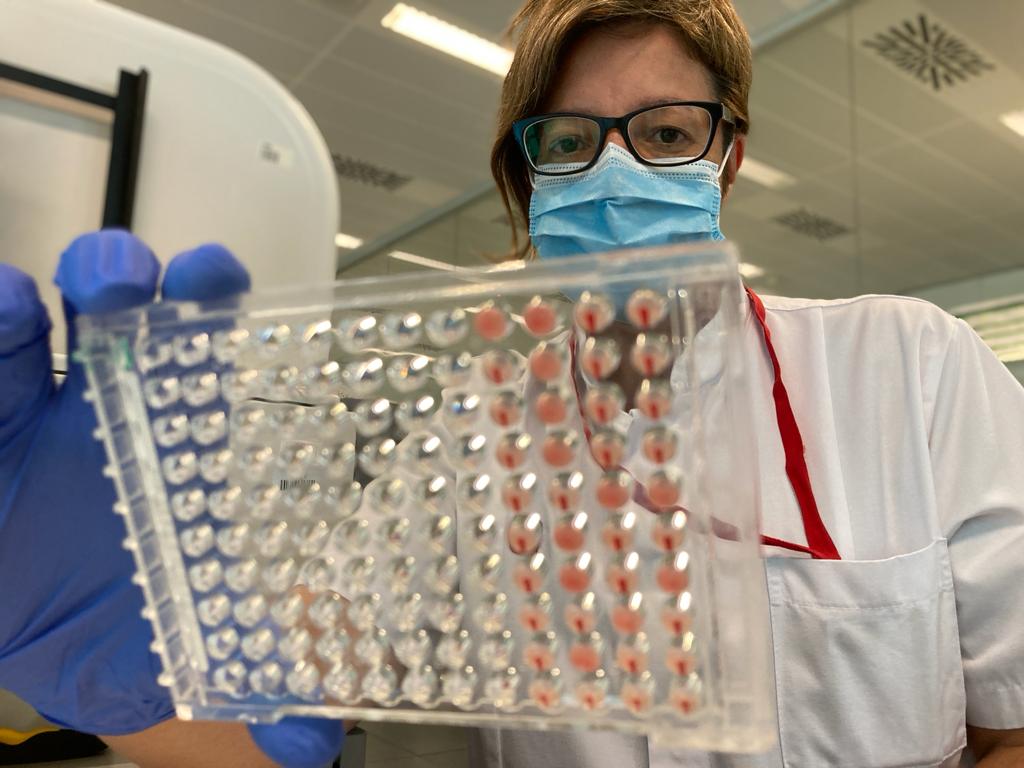Transfusion Safety Laboratory
 The Transfusion Safety Laboratory is a national and international reference in the screening of infectious diseases in blood donors.
The Transfusion Safety Laboratory is a national and international reference in the screening of infectious diseases in blood donors.
The laboratory carries out healthcare, teaching and R&D tasks.
Assistance activity
The main objective of the laboratory is to guarantee the safety of recipients and donors of blood components and to ensure the quality of the products to be transfused or transplanted in all hospitals in Catalonia.
It applies the common European and Spanish regulations for blood banks and other additional specific measures if the local epidemiological situation so requires.
It carries out serology tests on infectious agents (syphilis, HIV, HCV, HBV, HTLV and selectively Chagas, malaria), immunohematology of blood donors (ABO-Rh group, anti-erythrocyte antibodies and extensive phenotype relevant to transfusion), microbiology (sterility pots and microbiological quality control of products made from BST) and amplification of nucleic acids (HIV, HCV, HBV, HEV and, occasionally, second need: WNV, Dengue) in different types of human biological samples: peripheral blood (serum, plasma), umbilical cord blood, breast milk, etc.
The laboratory also offers screening services (serological and/or molecular) of infectious agents to third parties, such as national clinical laboratories and the Anthony Nolan Umbilical Cord Bank in the United Kingdom.
During the Covid-19 pandemic it is actively participating with the SARS-CoV-2 Plasma convalescent programme.
Educational activity
- The Lab is involved in the teaching of resident interns (Spanish acronym: MIR) in the speciality of Haematology and Haemotherapy, transfusion nurses, haematologists at the BST, pre-doctoral students, students on master's courses, undergraduate students in Health Sciences and laboratory technicians in the speciality of clinical analysis.
- The Lab participates in the "Master's Degree in Transfusion Medicine and Advanced Cell Therapies" at the Universitat Autònoma de Barcelona.
R&D and research activity
The laboratory collaborates closely with the Hepatology Unit of the Vall d'Hebron University Hospital, the Tropical Medicine Unit of the Vall d'Hebron University Hospital, the Microbiology Service of the Clinical Hospital of Barcelona, as well as with the Catalan Public Health Agency (ASPCAT) and the Centre for Epidemiological Studies on Sexually Transmitted Infections and AIDS in Catalonia (CEEISCAT) with the aim of developing basic, epidemiological and translational research projects.
The studies carried out in this department are aimed at planning and establishing strategies to guarantee the safety of blood products based on the correct selection of blood donors and the application of screening pots.
The main lines of research are:
- Viral Hepatitis (HBV, HCV, HAV and HEV) and co-infection with HIV
- Epidemiological surveillance of emerging infectious agents in the blood donor population (prevalence studies of SARS-CoV-2, Hepatitis E virus, malaria, West Nile virus, Hepatitis A virus, Tuscany virus, Dengue virus)
- Development of new tools for studying infectious agents (Chagas' disease, HTLV-I/II, Hepatitis A, Hepatitis E, Chikungunya, Malaria).